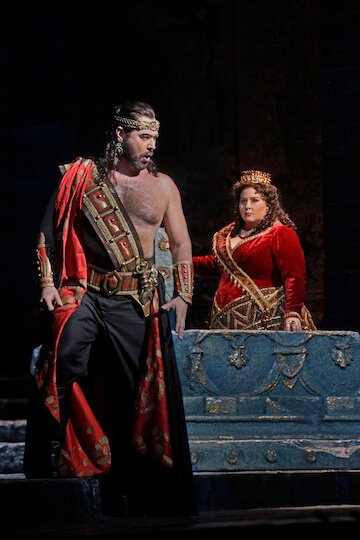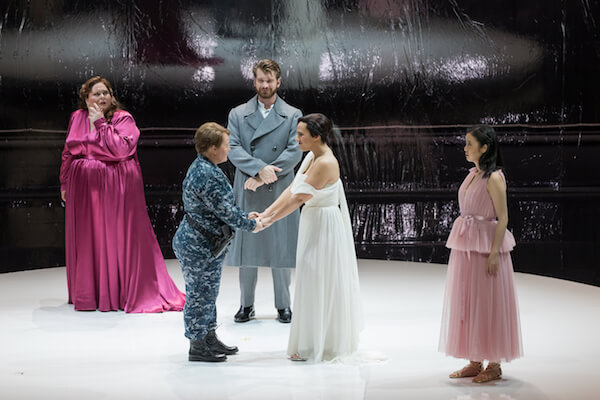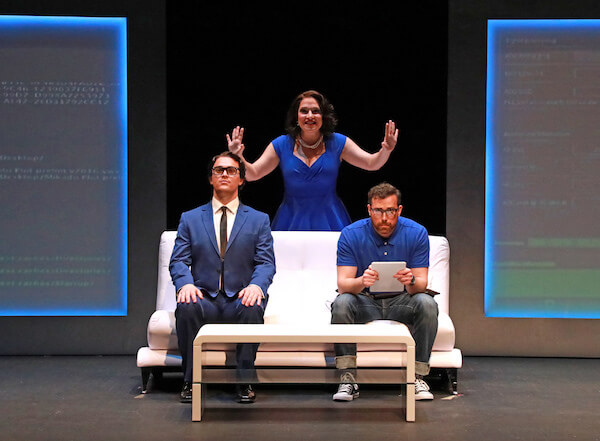Marius Brenciu as Prunier in Puccini's “La Rondine.” | KEN HOWARD/ METROPOLITAN OPERA
The George London Foundation’s duo recitals at the Morgan Library are always worthwhile events; all credit to the Morgan for providing such an aptly intimate space. January 13’s recital featured a welcome local appearance by Anthony Dean Griffey, a superb communicator with phenomenal diction. His tenor sounded warm and expressive in Dowland, Barber (“Sleep Now” a particular highlight), and Schubert. He gave a strong, stirring performance of Jimmy’s soliloquy from “Mahagonny.” Why does New York hear so little of this distinctive theatrical and vocal talent?
The room’s tricky acoustics were less flattering to Emalie Savoy, a highly gifted if still uneven Juillard-trained soprano on the Met roster. Savoy’s middle voice is rich and handsome, and her musical instincts are good. Poulenc’s “Sanglots” showed her best, though the quicker songs by him challenged her ability to articulate Apollinaire’s lyrics meaningfully. Mozart and Gluck selections showed inequalities at register extremes, the top sometimes glaring and harsh.
Large voices take time to smooth out. Still, Griffey has a sizeable top voice and his sterling example showed that suiting vocal heft to a small room is possible. Ken Noda was the superbly flexible pianist, a full collaborative participant.
Verdi, Puccini at the Met, along with recitals at the Morgan, Zankel, and a Boston Symphony “Requiem”
Carnegie’s Zankel Hall hosts some of the city’s best vocal recitals. On January 23, a knowing crowd greeted Dorothea Roeschmann’s rare local appearance with the proficient, occasionally over-fussy pianist Malcolm Martineau. The soprano stayed in her native German, concentrating on songs to Goethe texts by Schubert, Liszt, and Wolf — and adding on a few by other poets, including a whole set by Richard Strauss.
From the start of her career, Roeschmann’s singing has engendered a tension between her fine technical abilities and her seeming interpretive desire to perform outside their limits. If her still very attractive sound is not quite pristine, she phrases beautifully and with consistent, straightforwardly committed artistry.
One almost wished she had warmed up with Wolf’s less melodic output and left the stunning Schubert settings until her voice was flowing freely. Death and loss hovered over many texts — particularly the Liszt group, for me the evening’s highlight — but to hear a gifted, individual-timbred artist perform so feelingly proved very salutary.
Puccini’s “La rondine” returned to the Met January 14 as a debut vehicle for a beautiful Latvian soprano enjoying much acclaim in Europe, Kristine Opolais. Her looks, detailed acting, and small-bore lyric voice make her a natural for DVD and HD. Apparently she sounded great over the Met’s radio hookup, too.
In the house, one noted the limited vocal impact, though she opened up more in Act Three’s passion and fear. Opolais portrayed Magda gracefully and intelligently, but there seemed no personal timbre to remember. Increasingly, that once absolutely necessary quality for operatic stardom — not sounding like anybody else — seems relegated to the rare emergence of a Bryan Hymel or a Karen Cargill. I look forward to seeing Opolais’ considerable art again, but to me the sound per se didn’t raise the temperature.
Giuseppe Filianoti is a thoughtful, distinctive vocal artist, and like Opolais he looked ideal in his part. But the tenor approached his upper register very gingerly, indeed. After one near crack early on, he took most exposed notes down an octave, rather spoiling the usually fail-safe Act II quartet. I hope the valuable Filianoti finds his way back to vocal security.
Anna Christy (Lisette) gave a generic soubrette performance, hands on hips, but her chirp was pretty. As in 2008, the outstanding contribution came from Marius Brenciu, all charm and dexterity as the poet Prunier — the Chandler Bing figure. Ion Marin’s 1992/ 1993 Met outings seemed totally unjustified by anything other than his recording contract; good that he’s matured into a competent conductor.
Daniele Callegari’s propulsive Verdian conducting made “Il trovatore” two night later highly enjoyable on an orchestral and choral level, despite some very uneven singing. Three principals were well worth hearing. Indeed, Christophoros Stamboglis’ clear, resonant bass, triplets firmly in place, made him among the finest recent Met Ferrandos. Angela Meade demonstrated progress with both verbal clarity and ease of movement onstage. Much of her singing was technically impressive; the sound is clear and unspoiled and her voice certainly can move. Meade’s work was admirable without being particularly memorable — deep engagement with the soul remains lacking. That may come — or not.
Alexey Markov (Count di Luna) sang with handsome finish and tone that sounded imposing in solo moments, but occasionally dried up and tended to vanish in ensembles. The dark marbled sound goes up only so far; he audibly switches placement for high notes and fell into some typically Russian squeezed legato for “Il balen.” I wish Markov would give up parts like Scarpia and find coaches to help fulfill his considerable Verdian potential.
There the goodish news ends. There have always been mediocre, place-holding Manricos between the Carusos and Bergonzis; Marco Berti fits right in to the legacy of Juan Lloveras and Franco Bonanome — undistinguished if latinate sound, a few stray good notes, much braying, slithery pitch at soft dynamics, and nearly no stage artistry whatsoever. Surely, no one expected more of Berti. Why has the Met shunned Fabio Armiliato, a more than adequate spinto?
Met audiences rightly expect lots of Stephanie Blythe, a house favorite with a magnificent low-lying mezzo. Alas, she was clearly in vocal distress throughout, furiously recomposing music downwards and often barrel-housing her lines out an octave — or two! — down. Azucena certainly lies well within her interpretive powers, but Blythe — a savvy professional —should have been home resting, for her own sake as well as Verdi’s.
Real Verdian glory flowed from the phenomenally precise, imposing Tanglewood Festival Chorus at the Boston Symphony’s “Requiem” under Daniele Gatti on January 19. The orchestral playing — the brass positioned all around the front of gorgeous Symphony Hall — was also of high quality, and the great work proved satisfying, despite a certain lack of coordination. The solo singing was B/ B+ level, and each of Gatti’s international soloists had assets and flaws.
Fiorenza Cedolins’ flame-tipped veristic soprano offered “italianita” and some beautiful Renata Scotto-style piano singing but imprecise louder attacks and fluttery hollowness down below. Ekaterina Gubanova maintained consistency, but her vibrato-throbbed Slavic mezzo sounded off home ground. Stuart Neill, subbing for Fabio Sartori, sang without score and combined attractive floated passages with some very sharp tuning and an unfortunate breath lapse in the “Ingemisco”; there was not much poetry in the presentation.
The deepest expression and the steadiest singing — save for one muffled phrase — came from Carlo Colombara, his bass in much better shape than at his last Met outing.
David Shengold (shengold@yahoo.com) writes about opera for many venues.



































